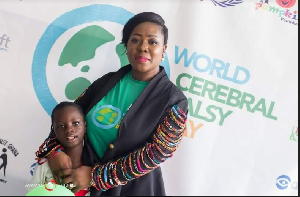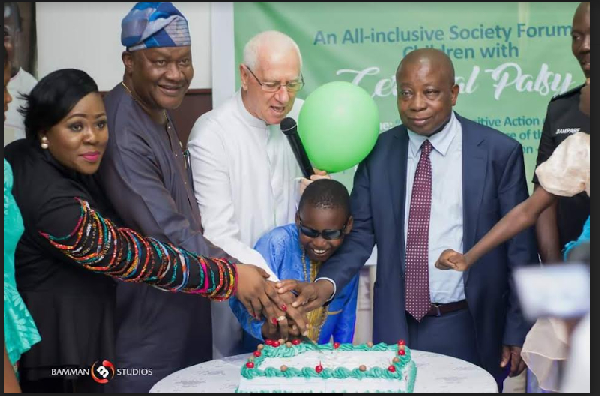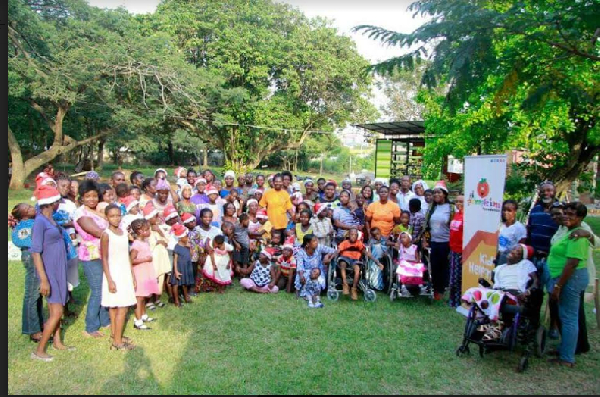 Founder and Executive Director of Pumpkins Foundation, Baisiwa Dowuona-Hammond
Founder and Executive Director of Pumpkins Foundation, Baisiwa Dowuona-Hammond
Pumpkins Foundation, a child-focused Non-Governmental Organization (NGO) marked World Cerebral Palsy Day on October 6, 2024, with a call to action for the government, stakeholders, and the general public to enhance support for individuals living with cerebral palsy (CP) in Ghana.
The Foundation urges increase awareness, inclusion, and concrete steps to ensure that individuals with cerebral palsy live full, dignified lives.
Cerebral palsy, a neurological condition affecting movement and coordination, is one of the most common motor disabilities in children.
According to Cerebral Palsy Africa, 1 in every 300 births in Ghana is affected by cerebral palsy.
Approximately 22,000 people are living with the condition in Ghana, as highlighted by Professor Eben Badoe, Head of Neurology and Child Service at Korle-Bu Teaching Hospital, on September 5, 2023, and published in Graphic Online.
Despite its prevalence, public knowledge and understanding of the condition remain limited, and resources for affected families are often inadequate.
Pumpkins Foundation, led by Founder and Executive Director Baisiwa Dowuona-Hammond, has been at the forefront of advocating for the rights and well-being of children with special needs, including those with cerebral palsy.
Over the years, the Foundation has improved educational outcomes and health services for children in deprived communities through its healthcare and empowerment programs.
The Foundation has also partnered with various stakeholders to deliver life-saving services, including medication assistance for families affected by cerebral palsy.
On this year's Cerebral Palsy Day, Pumpkins Foundation emphasizes the need for: Inclusion in National Policies: Government institutions must ensure that individuals with cerebral palsy are actively included in all relevant policies and national developmental agendas, from healthcare to education.
Subsidization of Medical Costs: The Foundation calls on the government to subsidize the often-costly medical treatments and therapies required by children living with cerebral palsy.
Getting access to affordable healthcare would greatly ease the financial burden on affected families.
Appeal to Health Facilities: The Foundation appeals to health facilities to reduce the cost of physiotherapy services for children with cerebral palsy by at least 50 percent, making much-needed therapies more accessible for families.
Increased Public Awareness: There is a pressing need for public awareness campaigns to educate communities about cerebral palsy and the challenges faced by those living with the condition.
This will foster greater understanding, reduce stigma, and promote early diagnosis and intervention.
Support for Families: It is important that stakeholders, including private sector organizations, provide support systems for families of children with cerebral palsy.
This could include financial assistance, counseling, and relief care services to improve the quality of life for both parents/caregivers and children.
Partnerships to Build Safe Environments: Pumpkins Foundation calls on donors, governments, and the general public to support the creation of safe environments for cerebral palsy children, their families and caregivers.
Caregiver Training:
Providing intensive training for caregivers is essential to ensure they can deliver high-quality care for children with the condition. Pumpkins Foundation will continue advocating for such training programs to improve caregiver skills in this regard.
Through the Foundation's advocacy, partnerships, and direct interventions, significant strides have been made, but there is still much work to be done. “No child should be left behind,” said Baisiwa Dowuona-Hammond.
“We must work together build a society that respects and accommodates the needs of every child, including those with cerebral palsy.”
As we celebrate Cerebral Palsy Day, Pumpkins Foundation renews its commitment to supporting children with special needs, and we urge all Ghanaians to join us in creating a more inclusive and supportive environment for children with cerebral palsy.

